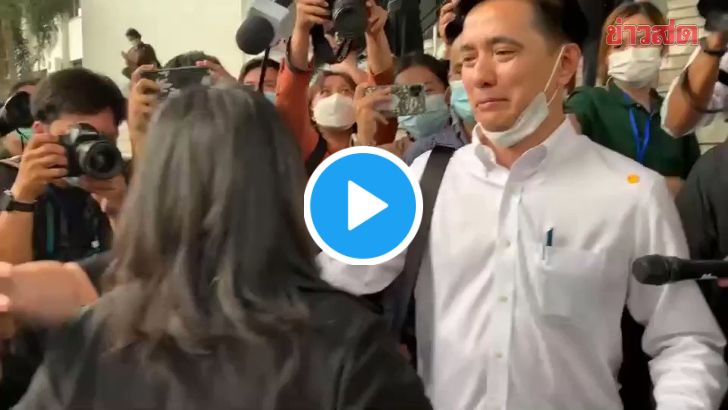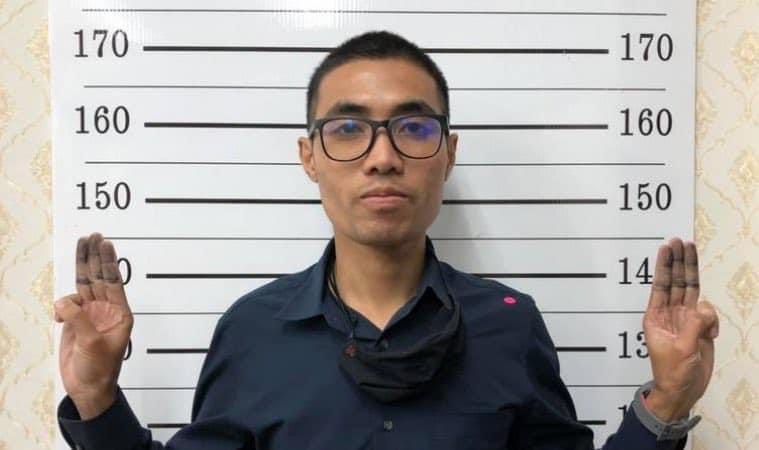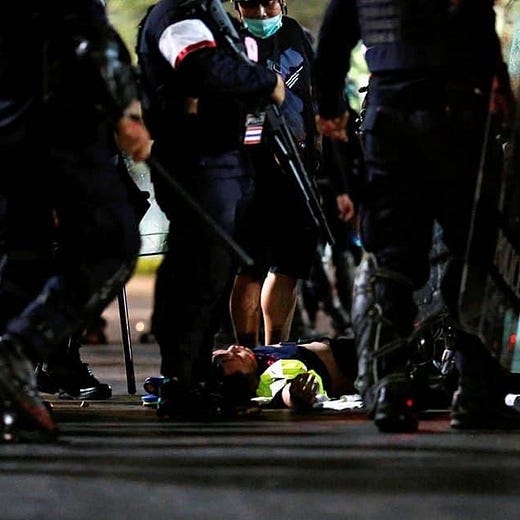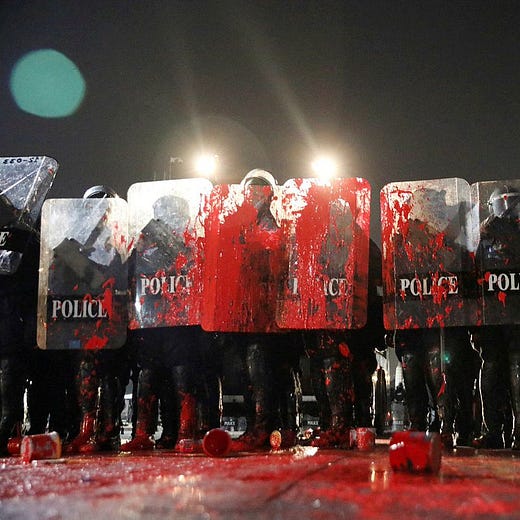If we burn, you burn with us: Thailand on the brink as lèse majesté crackdown escalates
Also in this edition: A beauty queen gets fired for standing up for human rights, an invaluable website is shut down, and a gangster is blessed by the king
Welcome to the Secret Siam weekly news roundup. If you missed it, over the weekend I published an article looking at Thailand’s modern history through the stories of five royal dogs. If you’d like to subscribe to read it you can do that here:
If you prefer not to pay, you can still sign up to receive free newsletters. Many thanks to everybody who is supporting my work, I really appreciate it.
The dangers of hopelessness
A few hours ago, Bangkok Criminal Court denied bail to three more protest leaders, Panusaya “Rung” Sithijirawattanakul, Jatupat “Pai Dao Din” Boonpattararaksa and Panupong “Mike” Jadnok, over lèse majesté charges for their role in a huge pro-democracy rally outside the Grand Palace on September 19 and 20 last year.
Pai already spent two years in jail from 2016 to 2018 just for sharing a BBC Thai biography of King Vajiralongkorn, and his mother wept outside the court after the news was announced. She was comforted by the mother of jailed activist Parit “Penguin” Chiwarak, and Thammasat University academic Prajak Kongkirati who had been there to offer a guarantee to try to secure bail.
The decision means that seven leaders of the Ratsadon movement are now in jail pending trial, which could take months or even years. Last month, Penguin, Anon Nampa, Somyot Prueksakasemsuk and Patiwat “Morlam Bank” Saraiyaem were also denied bail over over lèse majesté charges. The decision to refuse bail, when in contrast Suthep Thaugsuban and other leaders of the ultraroyalist PDRC were freed after just two nights in jail following their sentencing to years in prison on February 24, shows that the regime and the palace are determined to try to crush the democracy movement by jailing its leaders, hoping this will decapitate the protests and intimidate supporters into giving up their struggle.
The protest on September 19 and 20 at Sanam Luang was among the biggest pro-democracy rallies of last year, with tens of thousands of people packing the old cremation ground outside the walls of the Grand Palace. Panusaya gave a famous speech in which she directly addressed Vajiralongkorn without using the archaic rajasap language which Thais are traditionally supposed to employ when talking about the monarchy. Referencing the customary Thai declaration of deference to royalty, that commoners are just “dust under the dust under the feet of the king”, she said: “I’m one of the people who you might see as mere dust under your feet. I’d like to tell you that dust like us have rights and voices too.”
In another absurd charge, Panusaya has been fined 5.9 million baht for taking part in a protest on February 13 in which activists removed plants placed on Democracy Monument to try to stop activists gathering there.
The jailing of more protest leaders followed a depressing week in which several other high-profile activists were arrested, fuelling a dangerous sense of anger and despair among younger Thais fighting for democracy. The mood in Thailand is palpably darkening, and the exuberant optimism of last year’s protests seems very long ago now.
The plight of Thai singer Chaiamorn “Ammy” Kaewwiboonpan illustrates the perilously combustible atmosphere. As I reported last week, a portrait of Vajiralongkorn was set ablaze outside Klong Prem prison in the early hours of February 28. Police quickly said they had three suspects after studying CCTV images, and on March 2 they visited Ammy’s home in Bangkok with an arrest warrant. He wasn't there — he was in hospital in Bangkok with injuries that may have happened when he fell from the portrait, and after hearing police were looking for him he tried to escape but was eventually arrested in Ayutthaya last Wednesday. He has been charged with lèse majesté and arson, and has also been denied bail.
Ammy is the lead singer in beloved Thai band The Bottom Blues. One of their biggest hits, “1 2 3 4 5 I LOVE YOU”, has become an anthem of the protest movement. Here’s a video of them performing it live at Democracy Monument last year.
Protesters have adapted the words of the song to say “1 2 3 4 5 ไอ้เหี้ยตู่”.
In a Facebook post, Ammy admitted that he set the portrait on fire. He said he acted alone, out of frustration and shame:
When I was arrested on October 13 last year, Penguin was the first to telephone me when I was in the police van and called for a rally… But this time, Penguin and my brothers and sisters have been in jail for more than 20 days now, but I have not been able to help them. I feel ashamed and disappointed with myself.
His girlfriend was arrested last Wednesday as she tried to board a flight to Japan.
Last Thursday, 47-year-old Tiwagorn Withiton was arrested by around 20 police officers at his home in Khon Kaen. Last year, he posted a selfie on Facebook wearing a T-shirt printed with the slogan: “I lost faith in the monarchy.” Afterwards, he was forcibly taken to a psychiatric hospital for two weeks. Now he too faces years in jail.
On Friday, musician Parinya Cheewinkulpatom, known as Rishadan Port, announced he had been arrested in Thailand for lèse majesté too. Port was a member of the Faiyen political folk band who had to flee to Laos after the coup of May 2014. He even wrote a song about me, way back in 2013. In Laos they faced severe dangers, as the palace hunted and murdered Thai dissidents based in other southeast Asian countries, and in 2019 most members of the band escaped to France where they claimed political asylum. It was widely assumed that Port had gone with them, but in fact he was severely ill with health problems, and he quietly went back to Thailand to try to save his own life with medical treatment. Now he’s in custody, another Thai artist facing jail for standing up to do the right thing.
The onslaught of bad news and injustice has hit the Thai democracy movement hard. Many people see no way forward, and there’s a growing sense of nihilism, similar to the despair that darkened the Hong Kong protests in late 2019 and early 2020 when many young people concluded that their battle was lost but they may as well go down fighting. A slogan from the Hunger Games movies, which also inspired the three-finger “democracy salute”, was adopted by the protesters in Hong Kong and is now being shared in Thailand: “If we burn, you burn with us.”
Over the last couple of months there has been intense debate in the Thai democracy movement about whether violent tactics have any place in their fight. The orthodox position, espoused by exponents of nonviolent activism like the late Gene Sharp, Erica Chenoweth, and the CANVAS organisation created by Serbian activists, is that it’s futile to try to use violence against an oppressive regime because that’s a game they will always win, given their superior firepower and lack of scruples. Several times in recent protests, a minority of activists have thrown projectiles at police, leading to a disproportionately violent response, with the regime using water cannons, tear gas and plastic bullets, and beating and arresting protesters. Leaders of the Ratsadon movement, including those in jail, have implored protesters to avoid violence. They argue that it will only delegitimise their struggle and play into the hands of the regime.
One of the strongest arguments against using violence is that alienating the security forces will make it impossible to win, and that change can only be achieved if police and soldiers can be convinced to join the democracy movement. But Vajiralongkorn has already anticipated the risk of sections of the military and police turning against him — that’s why he turned the Royal Guard 904 into a formidable extremist force under his direct command that controls security in Bangkok.
There’s also an argument that the protesters can win by provoking the regime into a disproportionately violent crackdown that undermines its claims to legitimacy. This is a game that has been played many times in recent Thai history, and the royalist Yellow Shirt and PDRC movements have repeatedly deliberately tried to cause violence to bring down elected governments. Singha Beer tycoon Chutinant Bhirombhakdi told US ambassador Eric John that the Yellow Shirt riot outside parliament on October 7, 2008, was a deliberate attempt to provoke a deadly crackdown to try to topple the government.
There’s no indication that anyone in the democracy movement is trying to use such cynical tactics. The limited eruptions of violence from protesters are just an expression of hopeless anger. But if the regime continues to persecute legitimate demands for reform, the situation can only escalate. Following Ammy’s arrest, the hashtag #เผาขยะ — burn trash — trended on Twitter, with Thais sharing images and video of them setting fire to images of Vajiralongkorn.
There were widespread concerns that protests last weekend would lead to more violence, especially Saturday’s rally which was another “leaderless” event by the Free Youth movement that has rebranded itself as Restart Democracy, or ReDem. Ahead of the protest on Saturday, police swooped on the Potato Corner restaurant at the Major Ratchayothin shopping complex where Piyarat “Toto” Chongthep and his comrades in the We Volunteer guard movement were eating. Other WeVo guards then stormed the police convoy and released the detainees, sparking fears of escalating unrest, but all those arrested later peacefully turned themselves in.
Police claim those arrested had weapons in their possession and were planning violence, but this is highly improbable. In fact the WeVo movement has played a crucial role in keeping protests peaceful over the past year, and it’s likely the arrests were an attempt by the regime to provoke a confrontation.
The protest on Saturday went ahead peacefully. In an incident not reported by most media, activists piled trash under portraits of Vajiralongkorn and Bhumibol and set it ablaze outside the judicial court complex on Ratchadapisek Road.
All of the WeVo guards arrested on Saturday have been given bail, with one exception — Toto, the protest guard leader who has worked so hard to avoid violence in recent months remains behind bars, on bogus charges.
It’s clear that Thailand is at a tipping point, with severe risk that the regime’s escalating oppression combined with the hopelessness and anger of the protesters causes a spiralling descent into worsening unrest. In a tweet earlier today, the United Front of Thammasat and Demonstration said that if there is no justice in Thailand, “chaos will follow”.
More madness
In another dismal sign of the regime’s intolerance of anyone who dares to stand up for democracy and human rights, the winner of the Miss Universe Thailand 2020 pageant, Amanda Obdam, was fired as an ambassador for the Department of Mental Health after just five days in the role, following a campaign by royalists to remove her because she had criticised police brutality in cracking down on protesters.
After she was appointed mental health ambassador in February she was trolled relentlessly by ultraroyalists including Fuangrabil Narisroj, a former ambassador to Argentina, and Nopadol Prompasit, a whistle mob member in 2014 who later set up pro-junta Facebook page called “Cheer Lung”.
After being fired, she defended her remarks, saying: “Democracy and human equality is a basic principle of humanity”. She vowed to keep fighting to help people struggling with their mental health, through her campaign “Have You Listened?”
Dialogue of the deaf
On March 3, the Foreign Correspondents Club of Thailand hosted a panel discussion on the lèse majesté law, with Move Forward MP Rangsiman Rome, Yaowalak Anupan who heads Thai Lawyers for Human Rights, and academic expert David Streckfuss debating against Warong Dechgitvigrom of the Thai Pakdee Party, Arnond Sakworawich from the National Institute of Development Administration, and random royalist Sattra Toaon Rungsaeng. You can watch the full debate here.
It was great work by the FCCT to assemble such a strong panel to discuss such a contentious issue, but the main conclusion to be drawn after the three-hour event is that debate is futile when only one side is willing to listen and argue in good faith.
The whole point of the lèse majesté law is to criminalise legitimate discussion and debate, which makes even the most well-intentioned attempt to promote dialogue pointless. The three royalists repeatedly insulted and bullied the others on the panel, and Arnond’s antics were particularly egregious. He seemed barely able to listen to views he disagreed with.
The royalists wasted much of the debate on a pointless semantic discussion of whether Article 112 should be described as a lèse majesté law, and also contemptuously denounced Rangsiman Rome who correctly argued that the doctrine of sovereign immunity — “the king can do no wrong” — only works in a genuine constitutional monarchy where the role of the palace is merely symbolic and advisory. They also made their usual argument that all Thais agree with them apart from a tiny minority of troublemakers, when in fact the opposite is true — it’s the ultraroyalists who are the extremist minority. They argued for even harsher penalties for lèse majesté, of up to half a century in jail for each offence, provoking the usually polite Streckfuss to exclaim: “Get a grip!”
As an editorial on the Thai Enquirer website noted: “it was the liberals, and in no small part the interpreter, who tried to keep the discussion civil”. The article argued: “unless the conservatives are willing to shed some of their Thainess in favour of more humanity, true democracy may never take root in the Land of Smiles”.
In a comment on Facebook afterwards, Yaowalak of TLHR said: “I think the panel last night was useless. It wasn’t a venue to deliberate a common solution. I won’t be joining such a panel again. It’s a big waste of time. They didn’t talk with reasons but with emotions. How can we move forward?”
It’s a credit to the democracy side that they came to debate politely. But the event showed that the royalists have no interest in compromise or civil discussion, and this has ominous implications for the possibility of a peaceful solution to Thailand’s crisis.
Meanwhile, another crucial source of impartial information is being silenced. Khaosod English, the best English-language news website in Thailand, announced on March 6 that it was closing. A few hours later, the post was removed without explanation. Sources say that Matichon Group, which owns Khaosod English, has come under heavy pressure from the palace to shut down the website without a fuss.
Doubling down
As Thailand tumbles towards tragedy, the regime and palace seem determined to double down on their extremist approach, regardless of the danger to the kingdom.
Documents were leaked to me last week showing that the military is planning a new propaganda offensive and will start imposing ideological checks to ensure soldiers revere Vajiralongkorn. You can see the full document here and an excerpt is below:
Meanwhile, Facebook announced it had removed 77 accounts, 72 pages and 18 groups on Facebook and 18 accounts on Instagram controlled by the Thai military for “coordinated inauthentic behaviour” — a euphemism for propaganda — prompting absurd denials from senior generals.
In further proof of the regime’s embrace of thuggery and criminality, the most notorious man in the Thai cabinet, Tamanat Prompow, received special blessings from Vajiralongkorn. Thamanat spent four years in jail in Australia for smuggling heroin, something he had tried to deny until journalists found the court records. He then changed his story to say he was innocent because the substance seized by Australian police was flour, not heroin. He served another three years in jail in Thailand over the rape and murder of a male academic, before being eventually acquitted. He has a fake PhD from the Calumus International University, a bogus diploma mill — the thesis had five authors and was only 12 pages long including footnotes and references. He even lied about being ill in hospital in 2019. The king’s support for him just illustrates how bad things have become in Thailand in 2021.











Yes, Mr.Andrew MacGregor Marshall. Right Now I can sensed anger and despair all over thais social media. If like this awfully circumstances continue to grow, at last there maybe the Chaos (กลียุค) will follow krub...
Andrew MacGregor said UK Queen and Scotland king is bad same with Thai king